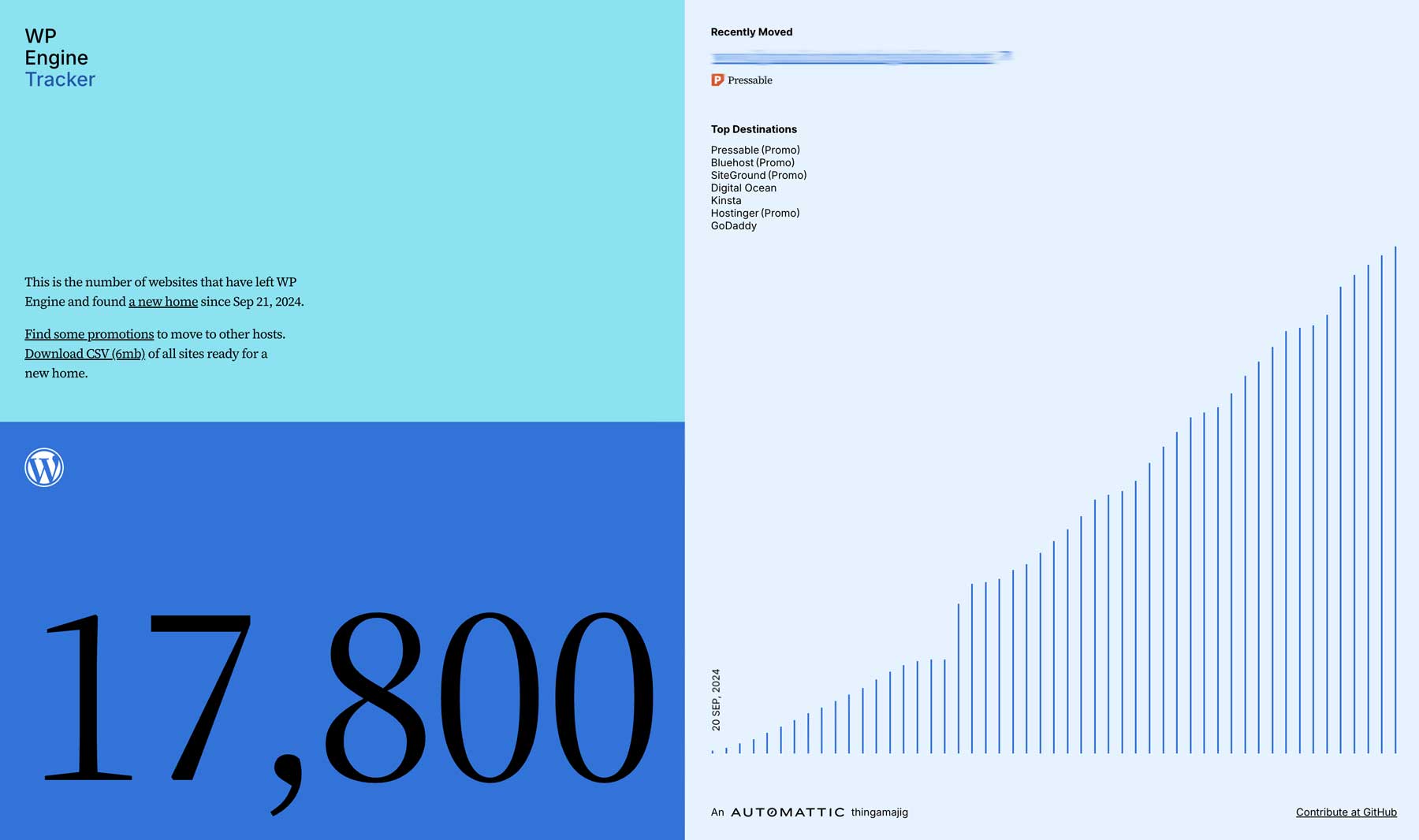In a fresh escalation of hostilities, Automattic has launched WP Engine Tracker, a website revealing how many sites have left WP Engine since WordPress co-founder Matt Mullenweg began his public war against the hosting company in September.
The site, which went live last week, tracks site departures, highlights competitor gains, and invites public contributions. It also includes a downloadable CSV list of all the domains WP Engine hosts, including staging and production sites. As of November 11, more than 17,800 websites have left WP Engine.
Initially, the site displayed only a basic counter and dark theme but has since been updated to include a line graph tracking site departures and a “top destinations” section showing where former WP Engine sites are migrating. Pressable, Bluehost, and SiteGround are among the most popular choices.
WP Engine has asked Automattic to shut down the site, telling The Repository: “Automattic’s wrongful and reckless publication of customer’s information without their consent underscores why we have moved for a preliminary injunction. WPE has requested the immediate takedown of this information and looks forward to the November 26th hearing on the injunction.”
The release of WP Engine Tracker is Mullenweg and Automattic’s latest move against WP Engine after the Automattic CEO called the rival hosting company a “cancer to WordPress.” In response, WP Engine took legal action, filing a preliminary injunction to halt Mullenweg’s public attacks and to restore its access to WordPress.org.
Court documents filed with WP Engine’s petition for an injunction revealed the company experienced a 14% increase in cancellation requests between September 26-30, a decline in “sales-assisted” new business, and a 375% rise in customers installing migration tools.
Mullenweg has seized on these numbers in recent weeks to bolster his critique of WP Engine’s service, describing the company in a recent CIO interview as “distressed” and “losing customers.” He added to this sentiment in an interview with TechCrunch Editor-in-Chief Connie Loizos, stating, “We’re at war with them; we’re either going to go brick by brick and take—us and other companies—take every one of their customers, or… hopefully, if they [WP Engine] could end this all tomorrow, I’d be happy to negotiate.”
Others have challenged the tracker’s rollout. A lookalike domain, wpenginetracker.com, was quickly registered by a protester who posted a simple message to Mullenweg: “Please stop.”
Over the weekend, the site was temporarily flagged for potential phishing, with Cloudflare placing a “Suspected Phishing” warning on the site before removing it and restoring access a few hours later.
There’s also been criticism of the site on Reddit and GitHub, where Automattic is encouraging contributions. Critics, including security researcher Daniel Ruf, have questioned the site’s purpose and methods. Ruf described the project’s detection of WP Engine’s sites as “amateurish” and noted rising frustration in the WordPress community, as well as potential security risks.
“I’m not sure what the goal of this website is and what Matt [Mullenweg] tries to achieve,” Ruf said. “But the community is getting increasingly annoyed of such unprofessional behavior of Matt and in the security community some also think about dropping 0days for WordPress and related plugins / themes due to this whole situation.”
TechCrunch’s Ivan Mehta pointed out the irony in the site’s domain, wordpressenginetracker.com, given Mullenweg’s accusations against WP Engine for trademark misuse. Posts in GitHub issues have also noted the irony of Automattic accusing WP Engine of trademark infringement while using the trademarked “WP Engine” on its tracking website.
Some have also argued that the tracking site violates WordPress’s own trademark policy since it uses “WordPress” in the domain name. Mullenweg, however, has clarified that this use is covered by Automattic’s commercial license for the WordPress trademark.
According to BuiltWith, WP Engine currently hosts approximately 598,124 live websites and 1,194,481 domains that redirect to these sites.
Beyond the tracker, Mullenweg has made several other moves against WP Engine, including banning the company and its employees—including StudioPress founder Brian Gardner—from WordPress.org. Core committers and contributors have voiced growing concerns over the recent turn of events, particularly as Mullenweg has also banned contributors who’ve questioned his decisions, introduced a checkbox on WordPress.org with vague legal implications, and disclosed a vulnerability in Advanced Custom Fields (ACF) shortly before Automattic assumed control of the plugin.
The Repository has contacted Automattic for comment.
Update, November 15: Article updated to clarify that the CSV lists all domains hosted at WP Engine, including staging sites.









Comments
One response to “Automattic’s New ‘WP Engine Tracker’ Site Fuels Ongoing Tensions with WP Engine”
I wonder where they got the data from, we all know what WordPress phones home with, what would stop them from doing that to anyone?